AudioThing’s MiniBit Synthesizer is not just another virtual analog Synthesizer but it emulates in a charming way the sound of 8-bit retro-gaming consoles.
There are many Synthesizer plugins on the market. From virtual analog synths, wavetable, FM, physical modelling and more. Many of these instruments are universally useable and fit into any music genre. Only a few are very genre specific and have a sound that fits exactly in one area.
One of these plugins is miniBit by AudioThing, a 8-bit/chiptune style Synthesizer that emulates the sound of 80s game consoles and retro-computers.
Overview: A Compact Lo-Fi Synth Engine
AudioThing’s miniBit features one main oscillator with 15 different waveforms and one sub square oscillator. If you look at the oscillator section, you will find an interesting selection of waveforms.
Triangle, Square, Pulse, Saw, Sine are more standard waveforms, but more specific ones are Bell, Motor, Noise, Transistor, Duck, etc. Especially the exceptional waveforms are exciting and allows endless 8-bit sound possibilities. The additional sub oscillator is here a square waveform and is pitch one octave below to add fatness to the sound. The dirt, grime, and distortion are the core of 8-bit sounds and because of these important characteristics, the developers added only waveforms without band limitation. This means, they produce nicely aliasing which is often avoided by top notch virtual analog Synthesizers.
The oscillator section is then routed to a simple 2-pole low-pass / high-pass filter. In terms of modulation technology, the developer left it simple and installed an LFO and an envelope for the volume. The LFO features 5 different waveforms (sine, triangle, saw, square & sample & hold) and can be routed to 4 different destinations (Pitch, volume, cutoff, sample-rate). Especially the sample & hold waveform or the sample rate destination are here perfect for shaping new unheard 8-bit sounds. With an additional amount knob, you can choose the depth of the LFO. Beside this, it comes with a classical ADSR (Attack, Decay, Sustain, Release) envelope generator.
To refine the sounds further, it features also a delay with a sync function as well as a bit-crusher effect.
A Creative 8-Steps Stepper Is Hidden On A Second Page
On the second page GUI page of miniBit, the AudioThing developers have built a very creative stepper which makes it very easy to design very cool 8-bit sequences.
The hidden sequencer is not a classical step sequencer but more a very deep sound design tool. This not only allows you to enter traditional notes but also other parameters such as volume, cutoff, resonance, waveform or sample-rate. On the right of the GUI, it’s also possible to randomise the values. Since you have so many different destinations in the stepper, it’s possible to design very exciting 8-bit sequences relatively easy and fast. Above all, I like that the fact that you can change the waveform per step, which can lead to very complex and crazy sound results.
One More Thing – Randomization Madness
One of the smartest features in the miniBit Synthesizer by AudioThing is not an innovative but one that gives you instant new creative input, the random function. With a simple click on the top of the GUI, musicians can create directly new sounds without touching the interface. What I have noticed during the test, is that you can achieve relatively good results with it. Sometimes only unusable noise but often also very good new sounds that can be perfected with slight changes. Same for the sequencer. Here, it’s also possible to activate the random function for each step which give you nice results.
Sound Demo
To get a good sound impression of the AudioThing miniBit Synthesizer, check out the video review just below.
Here are additional sound demos from the developer
Conclusion
AudioThing’s miniBit scored points in the test with a very good 8-bit chip-tune sound engine. The engine is very authentic and brings the charm of old retro-computer in an easy-to-use plugin back to any DAW. The oscillator section is here very well implemented which sets the Synthesizer significantly apart from the limits of traditional 8-bit sample libraries. Due of the different oscillator waveforms, 8-step stepper…, you are not limited to the available samples but users can design infinitely new 8-bit sounds with their favourite sound character. All this does not affect much the CPU of your system (PC & Mac) and you can easily use multiple instances without having problems with your setup.
As already mentioned before, the two randomization functions are super useful and gives you instantly new musical input without tweaking the engine. What I miss a bit in the miniBit Synthesizer are better presets. I miss very classic 8-bit sounds that have shape that time period. Since the engine is not a big obstacle for most computer-based musician, it’s relatively easy to recreate them.
Priced at only € 20, AudioThing’s miniBit Synthesizer brings back the iconic sound of the 80s gaming consoles and computers in a simple and interesting way. If you have a heart for chip-tune music, you can’t miss the small but nice miniBit Synthesizer.
Available here: AudioThing miniBit

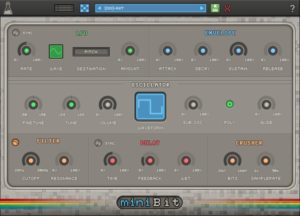
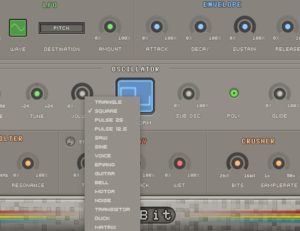
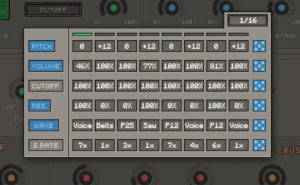
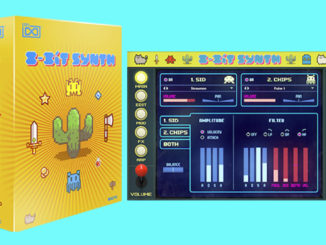
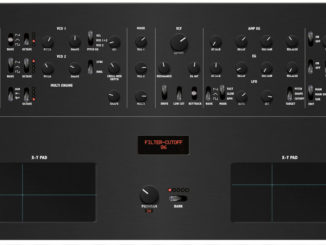
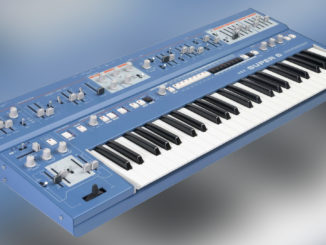
Be the first to comment